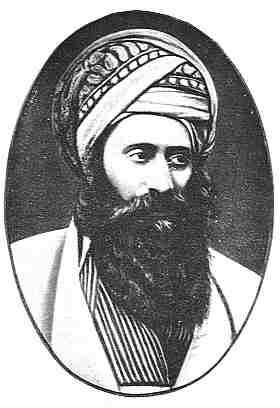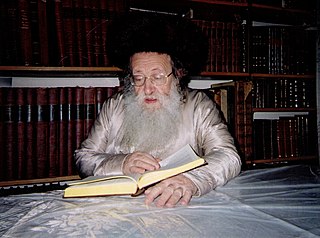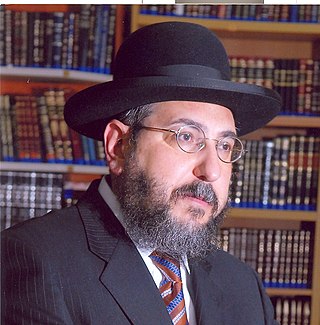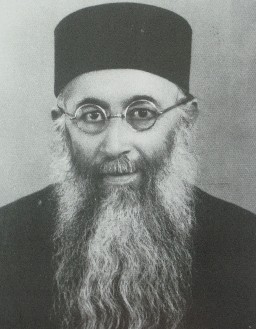
Rabbinic literature, in its broadest sense, is the entire spectrum of works authored by rabbis throughout Jewish history. The term typically refers to literature from the Talmudic era, as opposed to medieval and modern rabbinic writings. It aligns with the Hebrew term Sifrut Chazal, which translates to “literature [of our] sages” and generally pertains only to the sages (Chazal) from the Talmudic period. This more specific sense of "Rabbinic literature"—referring to the Talmud, Midrashim, and related writings, but hardly ever to later texts—is how the term is generally intended when used in contemporary academic writing. The terms mefareshim and parshanim almost always refer to later, post-Talmudic writers of rabbinic glosses on Biblical and Talmudic texts.

Moshe Chaim Luzzatto, also known by the Hebrew acronym RaMCHaL, was an Italian Jewish rabbi, kabbalist, and philosopher.

Mesillat Yesharim or Mesillas Yeshorim is an ethical (musar) text composed by the influential Rabbi Moshe Chaim Luzzatto (1707–1746). It is different from Luzzato's other writings, which are more philosophical.

Yosef Hayim was a leading Baghdadi hakham, authority on halakha, and Master Kabbalist. He is best known as author of the work on halakhaBen Ish Ḥai, a collection of the laws of everyday life interspersed with mystical insights and customs, addressed to the masses and arranged by the weekly Torah portion.
In Jewish law and history, Acharonim are the leading rabbis and poskim living from roughly the 16th century to the present, and more specifically since the writing of the Shulchan Aruch in 1563 CE.

Chaim Pinchas Scheinberg was a Polish-born, American-raised, Israeli Haredi rabbi and rosh yeshiva who, from 1965, made his home in the Kiryat Mattersdorf neighborhood of Jerusalem. He was the rosh yeshiva of the Torah Ore yeshiva in Kiryat Mattersdorf and Yeshivas Derech Chaim in Brooklyn. He was a posek, Gadol HaDor, and one of the last living Torah scholars to have been educated in the yeshivas of prewar Europe. He was often consulted on a range of communal and personal halachic issues. He was one of the rabbinic leaders of Kiryat Mattersdorf, together with Rabbi Yisroel Gans and Rabbi Yitzchok Yechiel Ehrenfeld. He was also a member of the Moetzes Gedolei HaTorah of Israel.

Yaakov Kamenetsky, was a prominent rabbi, rosh yeshiva, posek and Talmudist in the post-World War II American Jewish community.

Mercaz HaRav is a national-religious yeshiva in Jerusalem, founded in 1924 by Ashkenazi Chief Rabbi Abraham Isaac Kook. Located in the city's Kiryat Moshe neighborhood, it has become the most prominent religious-Zionist yeshiva in the world and synonymous with Rabbi Kook's teachings. Many Religious Zionist educators and leaders have studied at Mercaz HaRav.

Chaim Ozer Grodzinski was a Av beis din, posek, and Talmudic scholar in Vilnius, Lithuania in the late 19th and early 20th centuries for over 55 years. He played an instrumental role in preserving Lithuanian yeshivas during the Communist era, and Polish and Russian yeshivas of Poland and during the Nazi invasion of Poland in 1939, when he arranged for these yeshivas to relocate to Lithuanian cities.

Moetzes Gedolei HaTorah is the supreme rabbinical policy-making council of the Agudat Yisrael and Degel HaTorah movements in Israel; and of Agudath Israel of America in the United States. Members are usually prestigious Roshei Yeshiva or Hasidic rebbes, who are also usually regarded by many Haredi Jews to be the Gedolim ("great/est") sages of Torah Judaism. Before the Holocaust, it was the supreme authority for the World Agudath Israel in Europe.

Boruch Ber Leibowitz (Yiddish: ברוך בער לייבאוויץ Hebrew: רב ברוך דוב ליבוביץ, romanized: Boruch Dov Libovitz; 1862 – November 17, 1939, known as Reb Boruch Ber, was a rabbi famed for his Talmudic lectures, particularly in that they were rooted styled in the method of his teacher Chaim Soloveitchik. He is known for leading Yeshivas Knesses Beis Yitzchak in Slabodka and Kaminetz.
Matisyahu Chaim Salomon was an English-born American rabbi, author and public speaker. He served as the mashgiach ruchani of Beth Medrash Govoha, one of the world's largest yeshivas, located in Lakewood, New Jersey, United States. An opponent of unrestrained internet access in the Orthodox Jewish community, he spearheaded a campaign to have internet filters installed on all computers and smartphones.

The Beit El Kabbalist yeshiva is a center of kabbalistic study in Jerusalem. It consists of two buildings, one in the Ruhama neighbourhood of West Jerusalem, built in 1948, and another in Old City’s Jewish Quarter, built in 1974.

Hardal usually refers to the portion of the Religious Zionist Jewish community in Israel which inclines significantly toward Haredi ideology. In their approach to the State of Israel, though, they are very much Zionist, and believe that Israel is Atchalta De'Geula.
Zelik Epstein, also known as Zelig Epstein, was a prominent Orthodox rabbi and rosh yeshiva of Yeshiva Shaar HaTorah-Grodno, a private Talmudical institution in Kew Gardens, Queens, New York, containing a high school, Beis Midrash, and Kollel. Epstein was considered by many to be the last of the Gedolim of his generation.

Yechiel Fishel Eisenbach was a Haredi rabbi and long-time rosh yeshiva of Shaar Hashamayim Yeshiva in Jerusalem. He was widely regarded as one of the greatest kabbalists in Israel, and was an expert in the writings of the Arizal and the siddur of the Rashash.

Rabbi Haim (Emile) Amsalem is an Israeli politician and a former member of the Knesset. Elected to the Knesset in 2006 as a representative of Shas, he left the party in 2011 and established Am Shalem. The new party contested the 2013 Knesset elections but failed to win a seat.

Yaakov Hai Zion Ades, also spelled Adas or Adess, was a Sephardi Hakham, Rosh Yeshiva, and Rabbinical High Court judge. As rosh yeshiva of Porat Yosef Yeshiva in Jerusalem, he raised thousands of students, including Rabbi Ovadia Yosef, Sephardic Chief Rabbi of Israel; Rabbi Ben Zion Abba Shaul, rosh yeshiva of Porat Yosef; and Rabbi Yehuda Hakohen Rabin, Chief Rabbi of Bukharan Jewry in Israel.
Saul Adadi was a Sephardi Hakham, rosh yeshiva, and paytan in the 19th-century Jewish community of Tripoli, Libya. He was heavily involved in youth education, founding a yeshiva and co-founding and serving as principal of a Talmud Torah. He preserved the pinkasim of the Tripoli Jewish community, unpublished manuscripts of 18th-century Tripoli Jewish leader Rabbi Abraham Khalfon, and sefarim belonging to his father, Hakham Abraham Hayyim Adadi, a senior rabbi of the previous generation.














